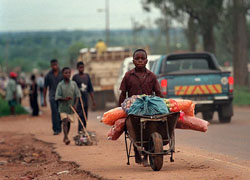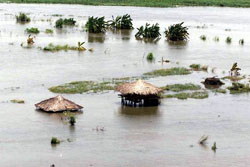Mozambique is one of the poorest countries on earth. The former Portuguese colony ranks 170 out of 173 countries on the United Nations Development Programme's Human Development Index, which assesses countries based on life expectancy, literacy and minimal income necessary to purchase goods and services. For Mozambique, the statistics are bleak: more than 70 percent of its population lives on less than $1 a day; life expectancy is 43 years, but due to the spread of HIV/AIDS, it is predicted to drop to 35 years in the future.
A 17-year civil war, which ended in 1992 with a peace agreement under the auspices of the United Nations, left much of the country's basic social and economic infrastructure devastated. About one million people died, and another five million were displaced during the war. Mozambique has since achieved notable success in rebuilding its economy and holding regular multi-party elections. Since peace was achieved, the country has had high growth rates: an average of 8 percent annually. Its debt service payments have been reduced, and it has used the savings to introduce free immunization for children.
In 1998, the government of Mozambique asked that the Carter Center's Global Development Initiative support a national consensus-building initiative known as the Agenda 2025 National Vision and National Development Strategy Process. National elections in 1999, floods, and political strife delayed the implementation of the initiative, but during that period the Center monitored elections and helped convince the opposition to participate in the process. After a meeting with President Carter in 2000, the main opposition party, Mozambique National Resistance, known as RENAMO, pledged its support. The Global Development Initiative, the only not-for-profit partner of the government in the visioning process, has secured resources to provide advice and technical assistance to Agenda 2025.
Mozambique President Joaquim Chissano appointed a national Committee of Councilors of civil and political leaders to oversee the process. The committee, in turn, appointed 12 working groups to address issues affecting every sector of society: the environment, health, education, the private sector, etc. Among the issues Mozambicans wanted to address in Agenda 2025:
The Agenda 2025 Vision and Strategy is expected to be presented to President Chissano in June 2003. The final Agenda then will be analyzed, debated, and endorsed by policy makers and translated into future governmental policies and programs.
GDI is partnering in Mozambique with the Millennium Institute, a Washington, D.C.-based nonprofit organization that has developed an integrated development model to measure the economic, social and environmental impact of different policy approaches on society. As part of its facilitation support to the drafting of Mozambique's Agenda 2025, GDI has added the model as an important tool for ensuring that strategy process and its content do not remain on a shelf but are implementable and responsive to the pressing social as well as economic growth needs of the country.
Read more about the Carter Center's work in Mozambique.
 |
A young boy takes his groceries home in Boena, Mozambique, a country trying to rebuild itself after civil war. Poverty, though, is widespread. "This process brings together Mozambicans from across the social and political spectrum to develop a shared long-term vision and strategy for the future development of their country. The Agenda 2025 process will assist Mozambique in identifying policy options and which options can feasibly be achieved." ----Edmund Cain, GDI director |
 |
Here in Caia in northern Mozambique, the Zambezi River crests over abandoned huts during a 2001 flood. |
Please sign up below for important news about the work of The Carter Center and special event invitations.